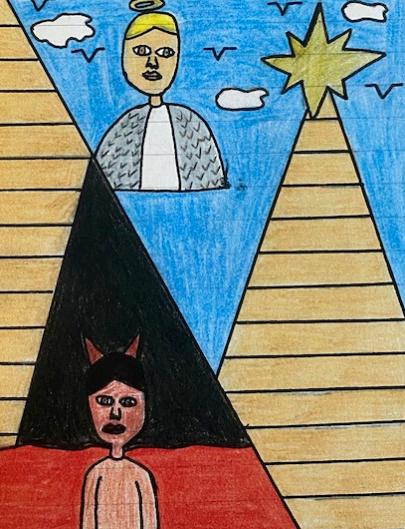
2 minute read
THE PATH TO HAPPINESS
ByMehar
Happiness can be a very complicated and confusing thing. One moment the most obscure thing may make us happy, but the next moment it doesn't, and the weirdest thing is that we have no idea why. Additionally, it differs hugely from person to person, and sometimes we can make up the oddest reasons to be unhappy or happy.
Advertisement
“The purpose of life” is one of the largest philosophical questions. I may be jumping to conclusions to make the statement that “the purpose of life is happiness”, however, I believe saying so takes away much of life’s complexities and hardships. As I mentioned earlier, causes of happiness differ for each individual. There are some who find happiness in bingeing Netflix shows all day and others who find it in a relationship or a career. This being said, a “path to happiness” isn’t as easy as it sounds – why would people go through the pain of studying to get into a good university, or a good job? Because the result brings them happiness. The idea is that the more you put in, the more happiness you get out of it. The more training an Olympic athlete puts in, the higher chance they have of receiving a gold medal.
So, is happiness that doesn’t require much of an input unworthy? For example, watching a Netflix show brings one happiness. But that contentment is short-lived and superficial. True, long-term happiness has to be earned: you have to train to be a good sportsman or practice to be a good musician, giving you skills which can then bring you happiness over time. The smaller bursts of happiness, like buying yourself a pair of jeans or a meal at a fancier restaurant, require smaller inputs and therefore last for a shorter time.
Kindness. Why are people kind? The first thing that comes to mind is to help others. Personally, after showing kindness to someone, I feel content and somewhat happy. This makes me wonder if, subconsciously, we are only kind in order to bring ourselves happiness. A fundamental concept in Jainism is Ahimsa, which means avoiding bringing harm to any living thing. Jain monks are shown to be calmer and more stressless than other people. Perhaps this is because they do not need to carry the weight of any guilt.
I believe that happiness should not be dependent on popularity and external factors. For instance, on social media platforms such as TikTok and Instagram, people often find happiness in gaining likes and comments on their posts. Whilst there is nothing wrong or immoral with this, it may be risky to put your happiness in the hands of your social status. Popularity can be fleeting, and losing people’s admiration certainly hurts. Therefore, basing your happiness around external factors that are not in your own hands definitely comes with a price, whereas leaving your happiness in your own control may be a better option.
That is to say – all happiness comes with a price, whether that be hard work, sadness, or even money. As they say, nopainnogain .
Ultimately, despite the conclusion that all happiness comes with a cost, I do persist in believing that it should be our final goal or target. After all, isn’t it better to work towards something knowing it will result in bringing you pleasure, rather than blindly following what you and those around you perceive to be the right thing? Life will always be filled with struggles; however, it is up to you to decide where they take you.









